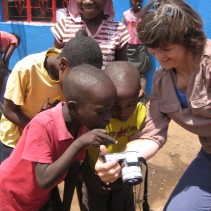

[hr]
This wasn’t going to be the topic of my blog this week, but I read an Op-Ed piece in today’s NY Times that compels me to share my answer to this serious (but hopeful) question.
Kennedy Odede, now 29 years old, grew up in Nairobi’s Kibera slum and never went to school, yet secured a scholarship to study in the U.S. He founded Shining Hope for Communities, which runs the tuition-free Kibera School for Girls (the WOW! Travel Club WOWees and I visited there about 18 months ago). His life story is fascinating. His intelligence is undeniable and his commitment to his community is admirable. Deservedly, he just made Forbes’ second annual list of 30 Under 30 Social Entrepreneurs.
But back to the question: “How do I deal with poverty?”
My first international travel experience – fresh out of college at age 23 – was to one of the poorest places in the world: Manila. Coming from modest midwest roots, I was appalled to see how people lived – crowded together in tiny, squalid shacks – living in dirt (which often turns to mud). No proper sanitation, water or sewage systems. Open-air markets. Flies and filth. Chaos and crowding. Although I stayed in decent accommodations, I learned the “asian squat” and the art of bucket baths. I met a girl, years younger than me, who was “indentured” to a wealthy couple. Linda had no opportunity for freedom because her impoverished parents owed money to the couple and supported the arrangement.
Despite it all, to my great surprise, people seemed happy. Maybe they complained among themselves, but I would have expected to feel a (deserved) sense of victimization. I would have expected them to be envious of my relative prosperity, freedom and opportunity. “Happy” is probably the wrong word, but they seemed content. Obviously, one who doesn’t have high expectations is more content with what (little) one has.
And so, in the late 70s, over the course of my 8-month adventure through what was then called the Third World, I developed an appreciation for “impoverished” places.
Fast forward to a sunny August morning in 2012, as I walked with several of my WOW travelers through the Kibera slum – Africa’s largest. People went about their business and paid little attention to us. Many were smiling or laughing or singing. They didn’t look emaciated or unhappy or brutal. I tried to imagine the horrors of the tribal violence in 2008 which flared in response to the contested presidential elections, when Luo and Kikuyu people murdered each other. Thousands died or were injured. Entire neighborhoods of homes (hovels) were torched. How could these nice people have done that to each other?

Shining Hope’s Water Tank – and the queue of women and kids waiting to fill up
We walked to one of Kennedy Odede’s Shining Hope projects. Standing in the shade of a huge water tank, we learned how women (and children) spend hours locating a vendor (often part of a water mafia), queuing up and balancing a 4-gallon jug of questionably clean water on their head. We learned that Kibera residents pay more for water than wealthier Kenyans in suburban neighborhoods, and more than even New Yorkers pay for water. They can pay up to 20% of their income on something as basic as water!
We visited the Girl’s School, where dozens of lively, bright, enthusiastic young girls were getting a free education.
Hope was all around us – if you looked for it.
[hr]
And that’s the answer to the question. I focus on the hope – not the horror. I focus on the people who are finding solutions – like Kennedy Odede and Marsha Wallace and the other 29 social entrepreneurs recognized in the Forbes article. I will continue to lead travelers to these destinations so they can see, learn and appreciate our similarities and meet the people who are creating hope.
I know I’ll never be one of the “30 Under 30,” and am quickly running out of time to make a 60-Under-60 list (if there is such a thing!), but I fervently believe in the power of travel to educate, employ and empower people on all sides of the question. Travel is another part of the answer.

Me and my WOWees pose with a few lucky young girls who are getting a rare education

Wheel barrows of fresh apples for sale in the midst of one of the world’s largest urban slums

Mothers of the students are required to support the school. Here, some smiling moms are making lunch.
Copyright 2025 WOW! Travel. All Rights Reserved.
7 Comments
Dee Hutchinson January 10, 2014 at 7:32am
Loved your insight into how you deal with poverty while traveling. I think we often equate happiness with being wealthy but these people prove that they have different kinds of wealth – strong communities, loving intact families, and hope. Good to see some of my fellow travelers in your pics – great article!
julie franz January 10, 2014 at 9:20am
That school positively radiated “Shining Hope” and joy! I was also inspired by the community library and newspaper office. I always appreciate seeing people working together (no matter what the circumstances) for a shared goal and a higher purpose.
Michael Day January 10, 2014 at 12:14pm
Bravo, Marilyn! So well done.
Nancy Coble January 11, 2014 at 11:03am
Marilyn,
Thank you for sharing your thought’s view’s on traveling in the under-developing countries.
Nancy Coble
Patty K. January 14, 2014 at 12:28pm
Well said Marilyn. Having visited there myself I had a very similar reaction. You would think everyone would be feeling sorry for themselves but that is not so. The people and the children make the best of what is available to them. We visited the girls in their classrooms and they spoke of their hopes and dreams….We heard the same hopes and dreams of children here. They are being “taught” ,”I can” and I know many of them “will”!
Thanks for sharing your insight.
Nancy L. February 8, 2014 at 5:09am
Thank you for sharing this message of hope. It is the glass half full …of people living, learning, loving and sharing.
Nancy L. February 8, 2014 at 5:10am
Dear Marilyn – Thank you for sharing this message of hope. It is the glass half full …of people living, learning, loving and sharing.